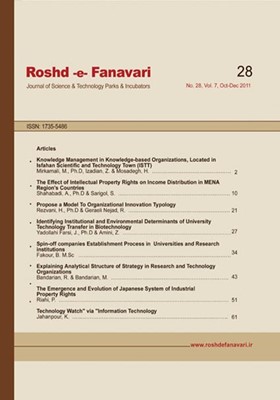The Emergence and evolution of Japanese system of Industrial Property Rights
Subject Areas :
1 -
Keywords: Intellectual property rights, Innovation Policy, Japan,
Abstract :
The influence of the intellectual property rights on the innovation and economical performance is of a complicated type and it is necessary to be precise while designing the IPR system which might be applicable for the economic development as an effective instrumental policy. While designing such systems, different countries go through different paths depending on the local context and the global environment. Thus, comparative assessment and benchmarking is widely used in most studies of policy-making. This article deals with case study evaluation of evolution procedures of IPR in Japan and at the end, it encompasses some suggestions for strategic design of this system in Iran. Japan has greatly benefited from its preliminary phases of development of the IPR. Technological learning in Japan has been established in support of a fragile system of IPR. This system paved all the way for absorbing innovation and beyond boundaries knowledge by the local firms. Some initiates such as “profitable models" and “the industrial designs” not only developed the patent culture in this country, but also it turned into a strong driving force for the incremental innovations and partial improvements based on the foreign ones. When the technological capabilities of the local agencies increased, and the firms were requesting for a stronger protective regime for their own inventions, Japan intellectual property rights system was reinforced in such a manner that presently it is considered as one of the most strict and complete IPR systems in the globe.


